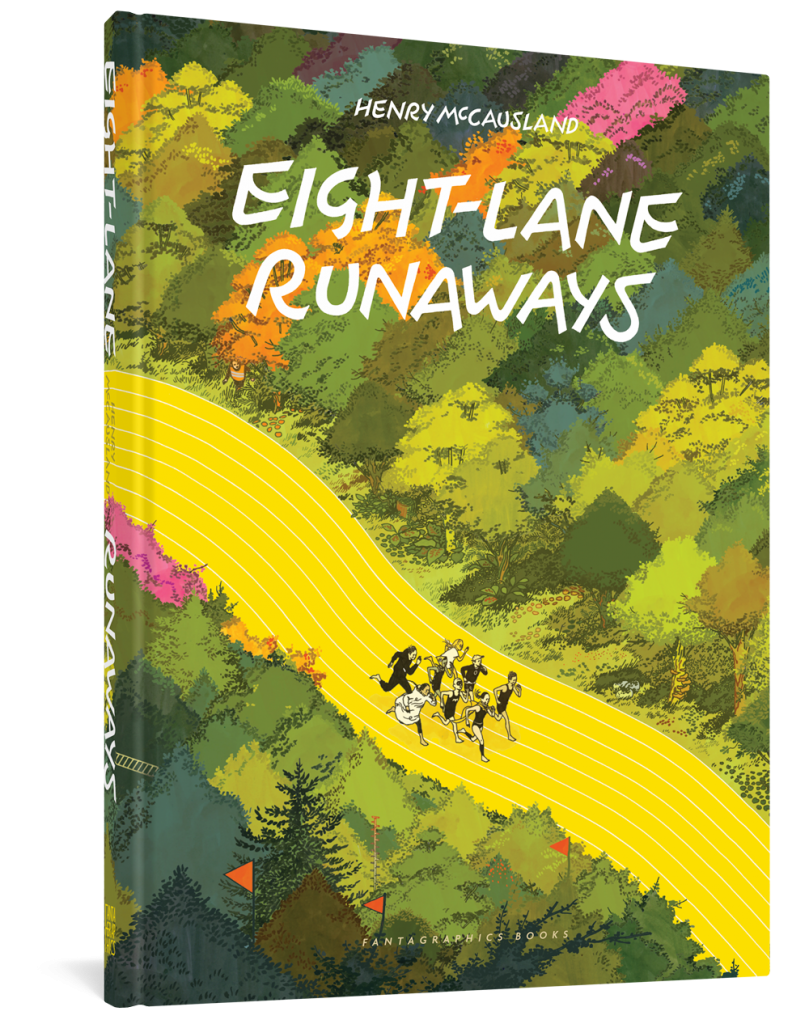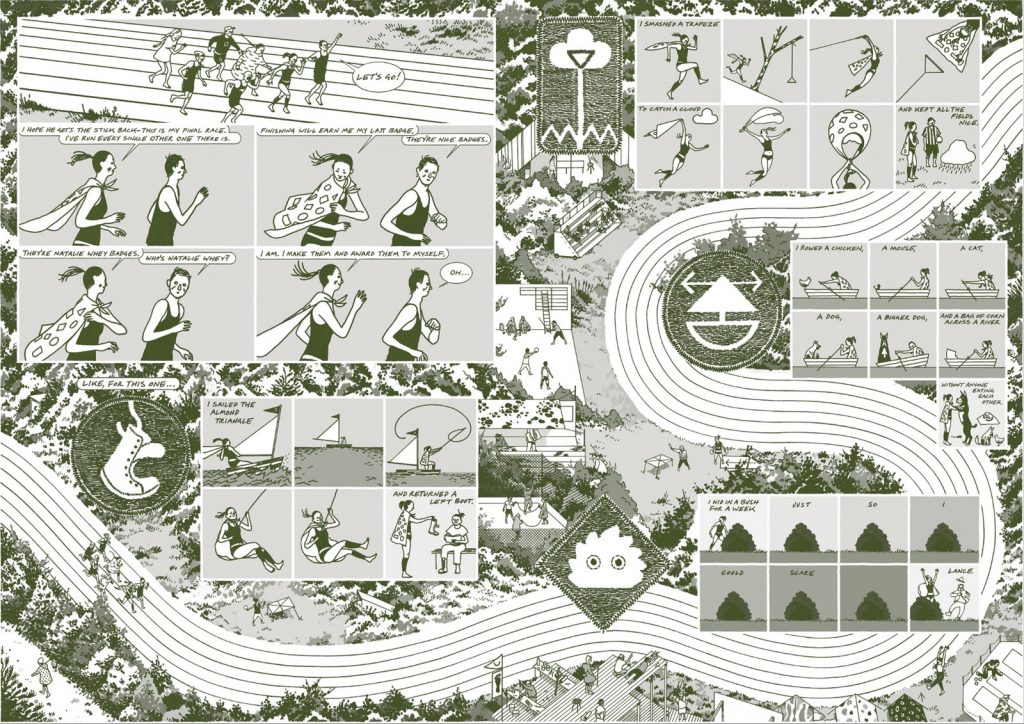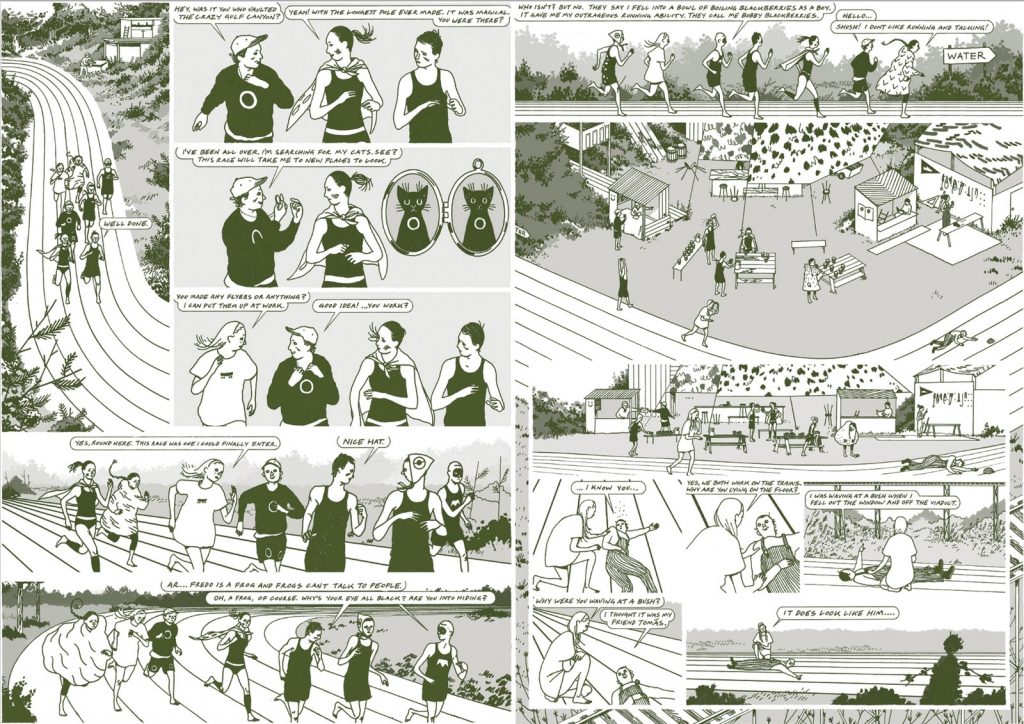
Life, they say, is not a sprint, but a marathon — and if you’re lucky, the finish line is a long way off. But for British cartoonist Henry McCausland in his debut graphic novel Eight-Lane Runaways (Fantagraphics, 2020), that tried-and-mostly-true axion is turned ever-so-slightly on its head: the marathon is not only life itself but the reason for living, and how his ensemble cast of runners came to be on the racetrack itself is almost of no consequence. This where they live, this is what they do, in a very real sense this is who they are.
As such, their individual goals are both singular and varied: Natalie is looking to earn a self-awarded merit badge. Bobby is out to prove to everyone — and probably even himself — that he gained “super-running powers” when he fell into a bowl of blackberries as a kid. Freddo wants to feel what it’s like to be a frog, to the point that he essentially self-identifies as one. Khoklakola is just following orders — that come her way courtesy of her magic poncho. And Oplo is looking for his lost cat with a complex and intricate system of strings. They all appear to fit generally into the “twenty-something” demographic, but beyond that, they couldn’t be more different. If they want to see this race through, though, they’re all going to need to learn how to run together rather than against each other.

The track they’re running on appears to perhaps encompass the entire world, although that’s debatable as one could just as easily make the assumption that it’s ultimately circular in nature — but either way, there’s nothing to indicate that everyone we meet might not be running forever. To that end, McCausland makes the rather bold choice of putting more emphasis on people, places, and things passed by than the runners themselves, who are rendered in fairly simple but agreeable terms, each afforded just enough by way of visual information to distinguish them from their counterparts but little else. In a very real sense, then, our attention is commanded more by the run than the runners, and if that doesn’t give away a large portion of the cartoonist’s central thesis, as reflected in the title of this review, then I don’t know what will.
Taking it a step further (sorry), formal inventiveness is perhaps this project’s hallmark feature: comparisons to the once-popular Where’s Waldo? series of children’s books are obvious, as McCausland utilizes panoramic double-page spreads, segmented into borderless “panels,” to offer expansive views of the frequently-bizarre surroundings the runners find themselves moving through, and the end result is equal parts immersive and alienating. Immersive because we’re drawn into the environments, alienating because the characters are reduced to transitory figures by design. It’s not that this doesn’t work, per se, please don’t think that — it simply means that you need to approach this book on McCausland’s own terms and that you might have a tough time getting much of anything out of if you don’t or can’t.

For my own part, I found the situations and groups they encounter to perhaps be more involving than the protagonists themselves for much of this book’s 96 pages, particularly when they encounter a bunch of folks looking to fly a manned kite to the moon, but a rather sudden flood shuffles the deck considerably, and our characters find themselves separated and pursuing individual paths as well as goals after this seismic narrative shift. One needs to replace a missing arm. Two find themselves tempted, Eve-and-the-serpent-style, by a juice concoction made from every berry and fruit in existence. Still others decide to push forward toward “victory,” whatever that even means. One even finds themselves in an alternate reality. Just when the book was running on fumes, then, McCausland finds that “second gear” you hear so many runners talking about. And he never breaks his stride from that point onward.

Ultimately, it’s the relative strength or weakness of the bonds of friendship formed between these disparate people that will bring them back together or keep them separated, and while “family is where you find it” is every bit the cliche that “life is about the journey” is, the thing to remember about cliches is that they all become such for a reason, that being that they’re true. And therein lies the quiet genius at the heart of Eight-Lane Runaways: McCausland — who went through something of a marathon of his own bringing this work to its present, completed form, having first self-published a couple of issues in black and white and riso-printed aquatic greens (ever the completist, I’m including sample images of the comic in each of its iterations with this review) — isn’t out to re-invent the wheel here or anything of the sort, but rather to have us re-examine the tried and true in exciting and unfamiliar ways. “There is magic to be found in the everyday” is, I promise you, the last cliche I’ll indulge in, but it’s also the one this entire book is predicated upon, and it’s the one that McCausland expresses with the most clarity and assuredness. Maybe there is no hard-and-fast “finish line” to the marathon that is human existence, but if we’re joined by the right people, and we help each other navigate through its ever-shifting landscapes as a team, then when all is said and done we can all emerge as winners.
SOLRAD is made possible by the generous donations of readers like you. Support our Patreon campaign, or make a tax-deductible donation to our publisher, Fieldmouse Press, today.

Leave a Reply